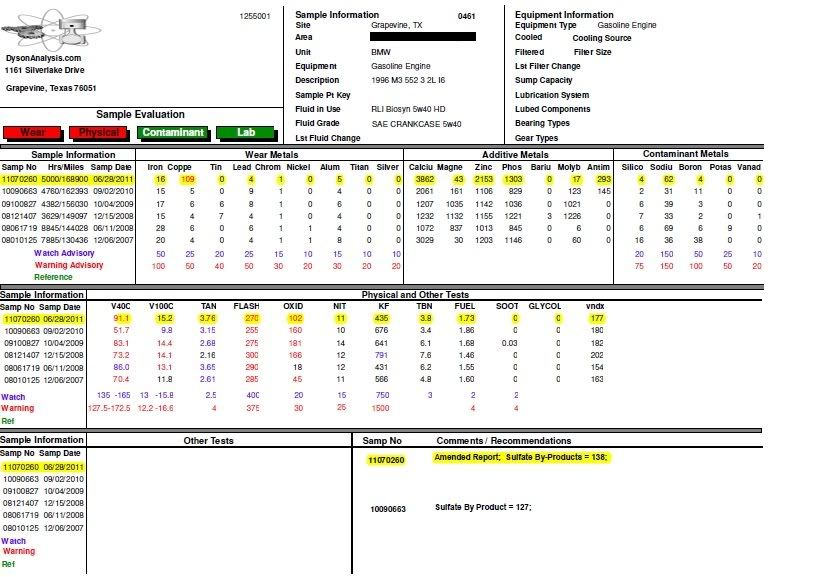Note that copper is an additive in this oil, hence the high ppm reading.
Summary of the OCI:
- About 6 months and 5,000 miles. As with the last time, I sampled early to compare with previous results.
- Driving was mixed: highway, suburban roads, and stop-and-go.
- Slightly heavy foot on cold starts, with a fair bit of throttle but never over 2500 RPM until coolant is at operating temp.
- Lots of WOT, but not much redline (although more than the previous run).
- Oil consumption is at a new low: about 1 qt/1600+ mi.
On the previous run, it appeared that the injectors were faulty, which probably contributed to the fuel dilution. I changed the injectors with rebuilt ones before this run, and they seem to be better. On the flip side, I'm getting a bit of hesitation on cold starts that I didn't get before, so presumably something else in the engine needs attention; that may be why the fuel dilution has not yet been resolved. We shall see.
Still, all the wear indicators are at or near the best they've ever been. As the chemistry settles, the results should get even better. Given that, plus the fact that RLI is a domestic innovator run by very nice people, I think I have finally found the product I'm going to stick with for the foreseeable future. I'll take the next run out to 7,000 miles and see how it does.
On to the report. I've highlighted the top line for better readability:

The other lines are previous samples. In order from top to bottom (click for threads):
RLI BioSyn SHP 0w-30
Motul 300V 5w-40 #2
Motul 300V 5w-40 #1
Motul 8100 X-Cess 5w-40
Motul 8100 X-Max 5w-30 (original formula)
Summary of the OCI:
- About 6 months and 5,000 miles. As with the last time, I sampled early to compare with previous results.
- Driving was mixed: highway, suburban roads, and stop-and-go.
- Slightly heavy foot on cold starts, with a fair bit of throttle but never over 2500 RPM until coolant is at operating temp.
- Lots of WOT, but not much redline (although more than the previous run).
- Oil consumption is at a new low: about 1 qt/1600+ mi.
On the previous run, it appeared that the injectors were faulty, which probably contributed to the fuel dilution. I changed the injectors with rebuilt ones before this run, and they seem to be better. On the flip side, I'm getting a bit of hesitation on cold starts that I didn't get before, so presumably something else in the engine needs attention; that may be why the fuel dilution has not yet been resolved. We shall see.
Still, all the wear indicators are at or near the best they've ever been. As the chemistry settles, the results should get even better. Given that, plus the fact that RLI is a domestic innovator run by very nice people, I think I have finally found the product I'm going to stick with for the foreseeable future. I'll take the next run out to 7,000 miles and see how it does.
On to the report. I've highlighted the top line for better readability:

The other lines are previous samples. In order from top to bottom (click for threads):
RLI BioSyn SHP 0w-30
Motul 300V 5w-40 #2
Motul 300V 5w-40 #1
Motul 8100 X-Cess 5w-40
Motul 8100 X-Max 5w-30 (original formula)

